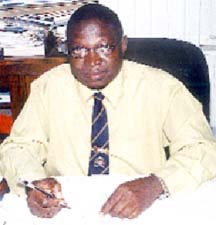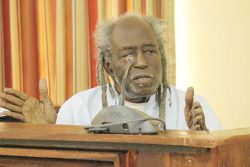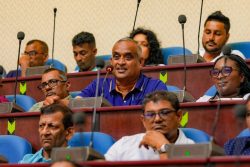Clerk Sherlock Isaacs has yet to comply with a request by Speaker Raphael Trotman to make preparations for the reconvening of the National Assembly next week.
Isaacs told Stabroek News yesterday that he was awaiting feedback from Clerks across the region on their interpretations of the Standing Orders and if his initial interpretation was indeed accurate or not. But for now, “as I see it nothing can be done,” he said.
Isaacs disclosed that Trinidad and Tobago’s Clerk of the House and consultant to the drafting of Guyana’s Standing Orders Jacqui Sampson-Meiguel was of the view that the Speaker’s request should be obliged and the government could take the matter to the courts.

Isaacs stated that Sampson-Meiguel’s feedback was largely based on the fact that the matter was being politicised. The Donald Ramotar administration has been accused of delaying the sitting in order to forestall a bid by the opposition party AFC to move a no-confidence motion against the government.
“I am trying to act professionally and I am using my discretion,” Isaacs said in relation to issuing his pronouncement on whether the Speaker has the authority to call a sitting of the National Assembly.
As of yesterday, Isaacs was still of the view that his initial interpretation of the Standing Orders were correct and that only the government could set a date for the sitting of the House.
Jamaica’s Clerk to the House of Parliament Heather Cooke, who was also contacted by Isaacs, wrote him earlier in the day and stated that based on readings of Jamaica’s, Guyana’s and the United Kingdom’s Standing Orders, the Speaker could only adjust a date for the House to meet but could not set one.
Guyana has no provision in the Constitution that would make allowances for circumstances whereby the government has delay-ed setting a date. Isaacs said a revision of the Standing Orders would be needed to address the situation in the future.
On Monday, Trotman requested that Isaacs make preparations for the National Assembly to meet next Thursday, after concluding that no direction from the government was needed. Trotman wrote that after consultations with Isaacs and former Speakers Sase Narine and Ralph Ramkarran, he had come to the conclusion that the Standing Orders have already settled the issue of when the National Assembly is to meet when a date is not fixed.
At the last sitting before the parliamentary recess, the Assembly was adjourn-ed to “a date to be fixed” and Isaacs has held that Standing Order 8(2) does not authorise the Speaker to call a sitting where there is no fixed date for the next sitting.
Trotman said he was in complete agreement with Isaacs as it relates to Standing Order 8 (2) but noted that it “cannot mean that the National Assembly cannot be convened unless by agreement; especially where such agreement appears elusive to even impossible.”
Isaacs’ belief that precedent establishes that the government is to set the date was further supported by a letter by then Speaker Ramkarran in which he had stated that the government held the sole responsibility of convening the National Assembly. At the time, Ramkarran was responding to a letter by the late MP Sheila Holder, who had requested an emergency sitting be called in January 2005 in light of the devastating flooding of the coastland occurring at the time.
Ramkarran has since stated that precedent was set with incorrect interpretations of the Standing Orders.
“It does not matter for how long a practice or precedent has been in force. It was wrong when it started. It is wrong now,” he wrote in his Sunday Stabroek column on October 26.
“By virtue of Standing Order 8(1), the Speaker must instruct the Clerk to ‘convene’ a sitting of the National Assembly, that is to say, to administratively set up a sitting on the ‘next sitting day’ in accordance with Standing Order 8(1). The Speaker has no power to fix any other date other than the ‘next sitting day’,” Ramkarran wrote.
Trotman took the decision to move for a sitting of the House after Govern-ment Chief Whip Gail Teixeira and Opposition Chief Whip Amna Ally were unable to agree on a date. Teixeira had stated that she was awaiting the ongoing talks between the President and the Leader of the Opposition, however this was debunked by APNU General Secretary Joe Harmon, who noted that a parliamentary sitting was never on the agenda.
When contacted yesterday, Ally told Stabroek News that she was “finished with the matter.” She had previously expressed her frustration that the government Chief Whip was not responsive to finalising a date for the first sitting since the parliamentary recess ended on October 10. Stabroek News was unable to reach Teixeira for comment yesterday.
Meanwhile, AFC leader Khemraj Ramjattan told Stabroek News, “I hardly see a subversion of the Speaker’s decision by the Clerk, especially so on this occasion. The Speaker has properly argued through and rationalised his decision and due respect ought to be given to it. It will be an extremely sad day if there is confrontation at this level.”
Ramjattan said that he stands by the Speaker’s decision to ensure a date is set and that the AFC would rise to have its no-confidence motion against the government addressed immediately. Ramjattan said, “That is our plan of action for the day. But we have to engage with APNU on this and we are to meet to work out these matters. We need a majority to suspend all other matters on the Order Paper and bring up the no-confidence as the one to be treated with and given priority.”
Stabroek News asked Ramjattan his opinion on the fact that the Speaker had made it clear in letters addressed to the Clerk, the leaders of the opposition parties and the Prime Minister Samuel Hinds that the House should reconvene and continue on with the business that was left off. Ramjattan said, “This is an option presented by the Speaker. We respect it. And, here again, we can flex as the necessity of the circumstances dictate. We have to be patient and see how this day plays out. I am pretty confident, however, that [the] no-confidence motion will be passed once Parliament is convened.”









